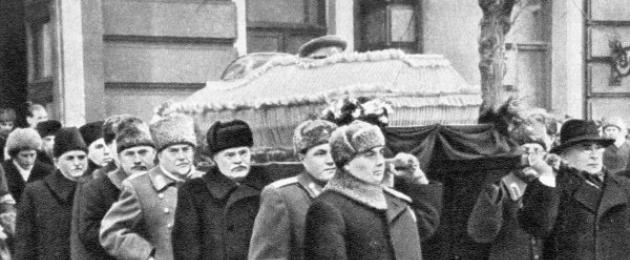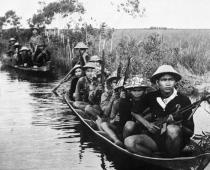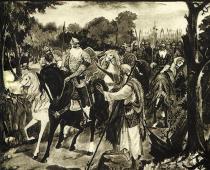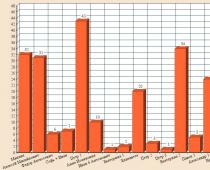Even decades after death Joseph Stalin his last days and hours are surrounded by an aura of mystery. Could the doctors help the dying? Was his inner circle involved in the death of the Soviet leader? Were the events of the first days of March 1953 a conspiracy? AiF.ru cites several facts related to the death of a person who forever left a mark on world history.
The fatal stroke was not caused by alcohol abuse.
There is an erroneous opinion that a fatal stroke overtook Stalin after a hearty dinner, where the wine flowed like water. In fact, on the evening of February 28, Stalin in the company Malenkov, Beria, Bulganin and Khrushchev watched a film in the Kremlin cinema hall, and then invited them to the Middle Dacha, where a very modest banquet took place. Eyewitnesses claim that Stalin drank only a little wine diluted with water on it.
Stalin's guests departed on the morning of March 1, but for the leader it was the usual daily routine - for many years he worked at night, going to bed only at dawn. According to the security guards, Stalin went to rest in a good mood. Moreover, he ordered the guards to go to bed too, which had not been noticed before by the leader.
The building of the near dacha of Joseph Stalin in Kuntsevo in Moscow. Photo: RIA Novosti / Press service of the FSO of Russia
Stalin did not call for help, the guards did not show initiative
Stalin rarely slept for a long time, and, as a rule, by 11 o'clock he had already received the first orders of the new day for the guards and servants. But on March 1, there were no signals from the leader. The pause lasted until the very evening, and at about 18 o'clock in the rooms occupied by Stalin, the light came on. But the leader still did not call anyone, which was, of course, an extraordinary event.
Only after 22:00 on March 1, 1953 did the security officer Lozgachev, taking advantage of the fact that the mail was brought, he decided to go into Stalin's chambers. He found the leader on the floor, his pajama pants were wet. Stalin was shaking with chills, he made inarticulate sounds. Judging by the lights on and the clock found on the floor, Stalin, despite the deterioration in his condition, could still move for some time, until he collapsed to the floor exhausted. In this position, he spent several hours. It remains a mystery why the leader did not attempt to call the guards and ask for help.
The leader's entourage pretended that nothing serious was happening.
What happened next allows a number of researchers to accuse Stalin's entourage of a conspiracy. The first reports of the guards on the leader's condition stumbled upon a very strange reaction. Khrushchev and Bulganin, having arrived at the Near Dacha, left it, confining themselves to a conversation with the guards. Beria and Malenkov, who arrived at three o'clock in the morning, declared that Stalin simply took too much at the banquet. At the same time, Lavrenty Pavlovich could not help but know that the leader did not consume a significant amount of alcohol, which means that his condition could not be the result of intoxication. There is reason to believe that all members of Stalin's entourage were well aware that something serious was happening. However, shortly before this, the leader began to renew the composition of the Soviet leadership, directly making it clear to the "old guard" that he intended to replace them. Khrushchev, Beria and others did not kill Stalin directly, but they did not leave him a chance of salvation, delaying the arrival of doctors as much as possible.
Doctors were allowed to see Stalin when he had no chance to survive
Only by 9 a.m. on March 2, a team of doctors headed by one of the best Soviet general practitioners appears at the Near Dacha. Pavel Lukomsky. Doctors diagnose - a stroke, ascertain paralysis of the right side of the body and loss of speech.
Later Vasily Stalin will shock those around him with cries: “They killed their father!” The leader's son was not far from the truth - it is known that the so-called "gold watch" is important to save the life of a stroke survivor. As a rule, doctors mean providing first aid within an hour, as well as delivering a patient to a hospital within four hours.But Stalin was found no earlier than three to four hours after the attack, and he received medical help after another 11 hours. It is not a fact that the 74-year-old leader could have been saved even with immediate assistance, but the delay of half a day left him no chance of survival.
Already during March 2, 1953, Beria, Malenkov, Bulganin, Khrushchev and other members of the "old guard" held meetings at which the top posts were redistributed. A decision is made that the new cadres nominated by Stalin will be removed from the main posts in the country. Doctors report that the Stalinist entourage understands perfectly well even without this - the leader has no more than a few days to live.
President of the USSR Academy of Sciences Alexander Nikolayevich Nesmeyanov read out the appeal of the Central Committee of the CPSU, the Council of Ministers of the USSR and the Presidium of the Supreme Soviet of the USSR to all members of the party in connection with the death of Joseph Vissarionovich Stalin. Photo: RIA Novosti / Boris Ryabinin
The people were informed about the serious illness of the leader on March 4
On March 4, 1953, Stalin's illness was officially announced. Twice a day bulletins about the state of health of the Soviet leader begin to be issued. Here is the text of the bulletin published in the Pravda newspaper on March 4, 1953: “On the night of March 2, 1953, I.V. Stalin, there was a sudden cerebral hemorrhage that captured vital areas of the brain, resulting in paralysis of the right leg and right arm with loss of consciousness and speech. On March 2 and 3, appropriate therapeutic measures were taken to improve the impaired functions of respiration and circulation, which have not yet resulted in a significant change in the course of the disease.
By two o'clock in the morning on March 4, the state of health of I.V. Stalin continues to be heavy. Significant respiratory disorders are observed: the respiratory rate is up to 36 per minute, the breathing rhythm is incorrect with periodic long pauses. There is an increase in heart rate up to 120 beats per minute, complete arrhythmia; blood pressure - maximum 220, minimum 120. Temperature 38.2. In connection with the violation of breathing and blood circulation, oxygen deficiency is observed. The degree of brain dysfunction increased slightly. Currently, a number of therapeutic measures are being carried out aimed at restoring the vital functions of the body. The last bulletin - on Stalin's condition at 4 pm on March 5 - will be published in the newspapers on March 6, when the leader will no longer be alive.
Photo: RIA Novosti / Dmitry Chernov
Stalin was stripped of power 1 hour 10 minutes before his death
Joseph Stalin lost even formal power during his lifetime. On March 5, 1953, at 20:00, a joint meeting of the Plenum of the Central Committee of the CPSU, the Council of Ministers of the USSR and the Presidium of the Supreme Soviet of the USSR began. After the report of the Minister of Health of the USSR Andrey Tretyakov about the state of Stalin, the redistribution of posts began in order to "ensure uninterrupted and correct leadership of the entire life of the country." Chairman of the Council of Ministers of the USSR, that is, the actual head of the country, was appointed Georgy Malenkov.Lavrenty Beria became the head of the united department, which included the Ministry of Internal Affairs and the Ministry of State Security. Chairman of the Presidium of the Supreme Soviet of the USSR Klim Voroshilov. At the same time, they did not dare to completely remove Stalin from the leadership - he was included in the Presidium of the Central Committee of the CPSU
The meeting ended at 20:40, that is, a little over an hour before the death of the leader. Information about it in the Soviet media appeared on March 7, but without specifying the time of its holding. The message did not mention that by the time these decisions were made, Stalin was alive.
The secrets of the last hours of the leader died with Colonel Khrustalev
From the moment the doctors appeared at the Near Dacha on March 2 until the last minutes of Stalin's life, one of the members of his inner circle was on duty next to his bed. During the meeting, at which posts in the country's leadership were redistributed, next to Stalin was on duty Nikolay Bulganin. However, at about half past nine in the evening of March 5, almost all members of the "old guard" gathered at the Near Dacha. At 21:50 Joseph Stalin died. Chief's daughter Svetlana Alliluyeva recalled: “Beria was the first to jump out into the corridor, and in the silence of the hall, where everyone stood silently, his loud voice was heard, not hiding the triumph: “Khrustalev, the car!”
The phrase "Khrustalev, the car!" became historical. Colonel of State Security Ivan Vasilievich Khrustalev since May 1952 he was the head of the bodyguard of unit No. 1 of the 1st department of the UO of the MGB of the USSR. Khrustalev replaced in this post Nicholas Vlasik, who headed the Stalinist guard for half a century. Many historians associate the passivity of the guards in the first hours after the stroke with the personality of Khrustalev, who is considered "Beria's man." Even before the removal and arrest of Beria, on May 29, 1953, Khrustalev was transferred to the reserve due to age. In December 1954, Stalin's last head of security died at the age of 47. All the secrets associated with the last hours of the leader's life, he took with him to the grave. © RIA Novosti
© RIA Novosti © RIA Novosti
© RIA Novosti © RIA Novosti
© RIA Novosti © RIA Novosti
© RIA Novosti © RIA Novosti
© RIA Novosti © RIA Novosti
© RIA Novosti © RIA Novosti
© RIA Novosti
- In contact with 0
- Google+ 0
- OK 0
- Facebook 0








